[ad_1]
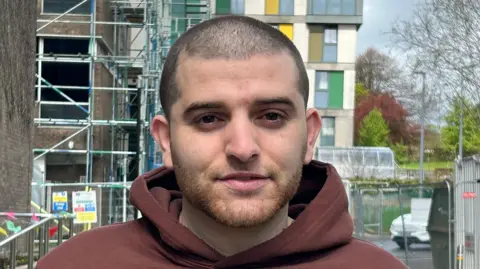 BBC
BBCUniversity students have described struggling to afford to eat meals due to rising living costs.
Kardo Mina, a final year law student at Swansea University who also works part time, said he regularly swapped meals for cups of coffee because doing so was “more financially viable”.
A recent survey of students in Wales by the National Union of Students (NUS) Cymru found that 58% said they had skipped meals due to difficulties paying rent and housing costs.
Swansea University said it recognised the financial and academic pressures faced by students and was committed to supporting their wellbeing.
NUS Cymru said financial pressures, including rising rents and utility bills, had made things “really difficult” for students.
Across Wales, the average rent costs rose by 8.9% over the past year, according to recent data from the ONS.
A range of household bills, including water, gas and electricity, also increased earlier this month.
A new pilot scheme which provides free meals for students has been set up to try to address the issue in Swansea.
Nourish and Flourish, funded by a grant from Swansea Youth Bank, is run by student volunteers and provides a meal, dessert and drink for 30 students, five days a week, during the exams and assessment period.
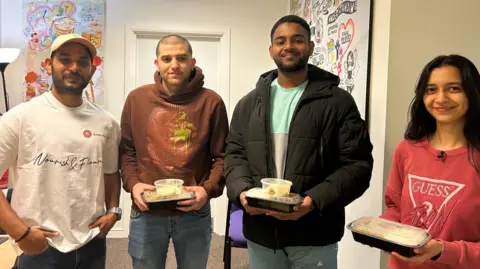
Kardo, from Swansea, said his living costs usually come to around £700 or £800 a month,
He was receiving meals as part of the project.
While Kardo does get support from student finance, he said he relied heavily on part-time work to make ends meet as he gets no extra financial support from family.
“I have some help from a scholarship I’ve got, but still that’s a lot of money I have to pay and budgeting for food, travel, accommodation and other expenses adds up too,” said Kardo, 24.
“Sometimes I have to skip some meals and replace it with coffee which is not healthy.
“I found it a lot easier to have a coffee instead of a meal because it was just more financially viable for me.”
Kardo said the meal scheme had made a difference to his health and ability to concentrate during the exam period.
“This meal helps me to have more free time, study more, and actually attempt the exam questions.
“I’m way more prepared, whereas for my first semester exams, I was not.”
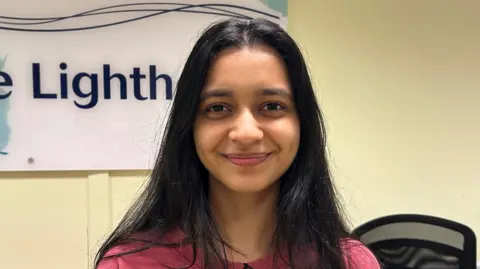
Nandini Sheth, 20, an international student from Sudan, usually works part-time to support her studies but has recently cut down her hours to focus on her final year at Swansea University.
Nandini said her tuition fees came to around £20,000 per year.
“In my first two years I was working more so I had more savings so I could get more nutritious meals,” said Nandini.
She said the meal programme had improved her access to healthy food.
“I wouldn’t say I’ve totally skipped a meal but if I can’t have a proper meal, I just keep snacking instead,” she said.
“Getting these meals every day gives me a better idea of quick things I can start preparing.”
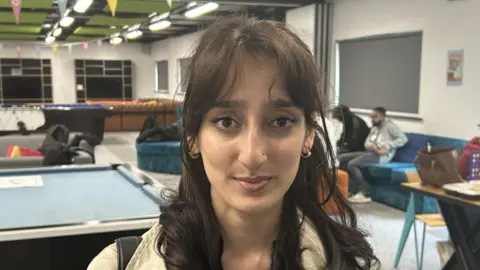
Tooba Zeb, 21, from Wolverhampton, is also a full-time student at the university, and said the meal support scheme had helped her.
“It has been difficult, especially this year,” she said.
“Things like meat cost a lot and living out, washing and doing laundry, that costs a lot too.
“This meal support has really helped me save on my groceries.”
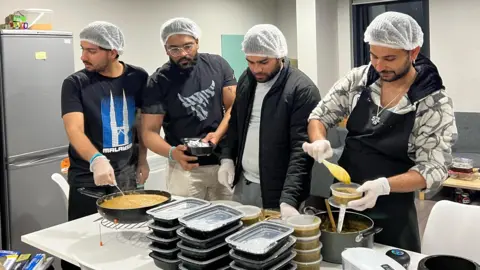 Naman Kumar
Naman KumarNaman Kumar, who set up the free meals project in collaboration with volunteers from Swansea University Hindu Society at the start of April, said the idea for the project came from his own experiences.
“There are so many things students face – there is academic stress, there are financial needs, they have to pay their rent,” he said.
Mr Kumar said the exam period was particularly challenging, which is why he chose to target the project around it.
“Every student is trying to give 100% so why not help them during this period and minimise the stress and anxiety that they feel,” he added.
A spokesperson for Swansea University said it was “inspired” by student-led initiatives like the meal scheme and welcomed conversations about how it could support similar efforts.

NUS Cymru president Deio Owen said students were having to “make tough decision between heating and eating”.
He said some students were also “missing out on social events, such as going for a coffee or catching the bus to go and see a friend”.
“Those things are really difficult for students now because of the financial pressures on them at the moment,” he added.
“We are seeing that heightened stress around examinations and assessments and then, if we are seeing that increase in students going to work part-time while they study, all of this bubbles in together at one of the most crucial periods of their time at university.”
What support is available from universities?
All universities in Wales offer hardship funds, discounted meals on campus and specialist advice on debt and budgeting through their student money advice services.
Some student unions, such as at Swansea and Cardiff University, also offer a “five free items” scheme to help students access essentials.
Swansea University said it had introduced one-off support payments to help with the costs of accommodation, travel, childcare, and postgraduate study.
Cardiff University runs a supper club for 100 students on a monthly basis and its university chaplaincy offers access to free hot drinks and meals.
Cardiff Metropolitan University said it had increased the number of emergency food vouchers available.
The University of South Wales offers free stationery supplies on campus to help with costs.
Bangor University, University of Wales Trinity Saint David, and Wrexham University’s student unions run stations where students can access free food and meal kits.
Wrexham University’s student union also runs a weekly breakfast club.
Aberystwyth University runs a hub where students can access free food, clothing and homeware.
[ad_2]
Source link




